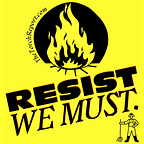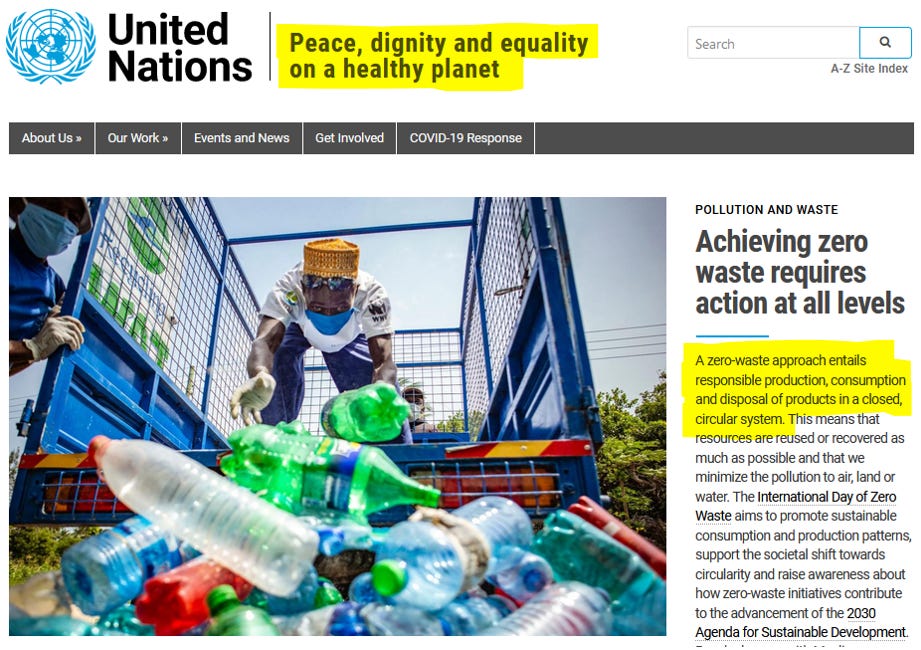They’ve got a plan.
I know that you know the globalist agenda is not what it seems. We’ve discussed at length the infiltration of Communist ideals into the various blueprints they have been developing for the last 100 years or more. Originally organized as the League of Nations after WWI, the UN was formally established in 1945 directly after WWII—and their agenda has been expanding ever since.
Today, the United Nations summarizes their far-reaching mission as a moral imperative to “ensure peace, dignity, and equality on a healthy planet,” which sounds nice, but to the keen mind is at once a deceptively farcical statement. Taking a look at the front page of their website, we find this:
“A zero-waste approach entails responsible production, consumption and disposal of products in a closed, circular system.”
While lofty goals such as “zero-waste” may serve to motivate and inspire the minions, the devil is in the details. Being unaware of the UN’s overarching intent to consolidate power and control into a centralized global governing apparatus—aka Global Digital Government—most of the public supports the political leaders who sign on to these plans, believing that they are being responsible global citizens.
Of course, when it comes to the globalist agenda, we know they use language that has a “hidden, higher meaning,” per the Communist Manifesto. We know they deploy the Marxist tactics of “dialectical materialism” to incrementally nudge public discourse toward accepting central control. And, as always, the ideas appear palatable, even desirable, until their language is parsed and their true intentions are revealed.
So let’s parse their words.
First, let’s just be perfectly clear: “A zero-waste approach” does not, will not, and cannot ever actually achieve a “zero-waste” global economy. Logically speaking, that’s impossible and completely incongruent with reality. In light of this week’s study, this is where the dialectics come in. It’s words like this:
The thesis is that humans are destroying the planet.
The anti-thesis is the “zero-waste” approach to global policy.
The synthesis is the “circular system” that ensures so-called “responsible” production, consumption, and disposal of everyday products.
Sounds good, right? They have successfully framed the conversation in a way that shifts public sentiment away from local level policy, in favor of global level control. Because, after all, who else can coordinate the collective efforts of humanity to save the planet and ensure peace, dignity, and equality for all? Only the global cabal.
Let’s not forget that global leaders are operating on the assumption that they have a responsibility to protect the planet from destruction, and all people everywhere from everything else. This responsibility to protect (R2P) has been intentionally developed among “enlightened” leaders for decades. It appeals directly to the ego of powerful people, the people who have the money and political clout to provide this mythical protection. Indeed, this R2P framework—originally developed by the UN in 2001—has been baked into virtually every global initiative for over twenty years.
This is important to understand, because it has become the conceptual capsule that allows the global elites to develop and disseminate their plans for centralized control through the thousands of non-profits and NGOs they are using to build out the New World Order. Just to give you an example, regarding the roll out of global digital governance, consider the implicit coordination between these organizations:
UN Department of Economic & Social Affairs on Digital Government
Digital government: Foundations for global development and democracy
Global Trends in Digital Government: Local E-Government Development
Introducing the WEF Global Consortium on Digital Currency Governance
And on and on and on…
Which reminds me of this article that was referenced on Monday:
That kind of ties it altogether, doesn’t it?
When you see the words “post-pandemic” think “The Great Reset.”
When you see the words “socially conscious transformation” think “menticide.”
When you see the words “digital world” think “total global tyranny.”
Which brings me back to the globalist’s “zero-waste approach entails responsible production, consumption and disposal of products in a closed, circular system.”
It brings up an interesting dichotomy: politics control the economy, and the economy controls the politics. It goes both ways, which exposes the insidious nature of all the global public-private partnerships that permeate and orchestrate the global agenda. Selling the idea to the public as some sort of great innovation, the reality of the situation is that the global elite now control both sides of the equation. This allows them to coordinate their collective efforts to consolidate power and control.
Thus, the tension between Capitalist and Communist ideals has been resolved, synthesized into symbiotic relationships that transcend local, state, and national governments—this too is the outcome of decades of applied dialectics.
Yet the roots of both philosophies remain embedded in the agenda. From the Communist side, we see the increasing consolidation of power and control being driven by cultural revolutions all around the world. From the Capitalist side, we see the eager greed of opportunities to “Build Back Better” with the endless stream of cash flowing from the government printing press. It’s a win-win situation.
Governments make the policies that incentivize the private investments. Private investments are backed by institutionalized (government backed) banks. The money flows in a circular fashion from one organization to another, as do the human resources, with CEOs and politicians cycling through the various revolving doors of the myriad public-private partnerships that make this all possible.
This powerful, unholy alliance is driving the Great Reset. This is, in my mind, the very essence of the global cabal. It’s the idea that they have a responsibility to rule us all, in order to save the planet, all dressed up as some form of altruistic philanthropy. But again, we only need to parse their words to reveal their true intent.
What is “responsible” production and consumption of goods? We’ve talked about it before—particularly in TR 93 - One Agenda to Rule Them All—but just briefly this includes keeping fossil fuels in the ground, taxing polluters, regulating what foods are available in “public spaces,” allowing the government to control your thermostat, “fundamentally restructuring” the economy, and limiting volumes of consumption.
According to the UN Sustainable Development Goals:
“Breaking these cycles of destruction for the planet and human health requires legislative action, corporate reform and individuals to be supported and incentivized to make healthy choices.”
Legislative action. Corporate reform. Incentivized choices. This is all designed to facilitate behavioral change, and it is creating behavioral change, very little of which is actually in the best interest of the average peasant. The ideas being forcefully branded into the public psyche do not serve to elevate individual well-being. Instead, this heavy-handed psychological conditioning serves to elevate the “collective well-being” of humanity—which sounds good, until somebody actually stops to think about it.
How?
How are they going to ensure peace? By disarming the global population, not immediately, but one generation at a time, slowly, incrementally, by changing the policies, by changing perceptions. In time people will gladly give up their guns, just you wait and see—especially when it’s “incentivized” and reaps public praise.
You may scoff at the thought of it, thinking “out of my dead lifeless fingers,” but you are an anomaly. Think about future generations. They will turn in your guns.
How are they going to protect people’s dignity? Well, for starters, they’re going to define what dignity means, extracting from the nebulous term whatever concept suits their agenda in the moment. But ultimately, they’re going to use this term as a dialectic tool to drive “wedge issues” that divide social groups into familiar camps that can then be poked and prodded to the benefit of national politics.
In other words, the idea of dignity will be used to demand more government intervention on behalf of protected classes, which fuels class warfare, forever.
How are they going to deliver global equality? The short answer is they’re not. But that won’t stop them from promising this pie-in-the-sky ideal and selling the useful idiots on greater and greater government control over every aspect of our lives. The only way to deliver equality on behalf of the greater good is if the government is in control of the means of production and consumption. It’s a timeless tactic.
Did you miss that one little word that gives away their plan? Let’s read it again:
“A zero-waste approach entails responsible production, consumption and disposal of products in a closed, circular system.”
You see it? It’s a closed circular system. Kind of like the closed circular thinking that is so pervasive in the public mindset these days. Isn’t it interesting that at the center of an ostensibly open and inclusive global society, we find a closed circular system?
Thus, we see how circular thinking justifies the fantasies about a circular economy that ultimately fuels the desires for total global control. It is a closed loop indeed, and one only need to step out of the loop to see just how ridiculous and dangerous the whole idea is. Nevertheless, getting people to take that step will be no small feat.
PS: Don’t forget, now it’s easy to catch up on previous episodes by listening to The Torch Report on iHeart Radio, Spotify, Google Podcasts, or Apple iTunes —enjoy!













